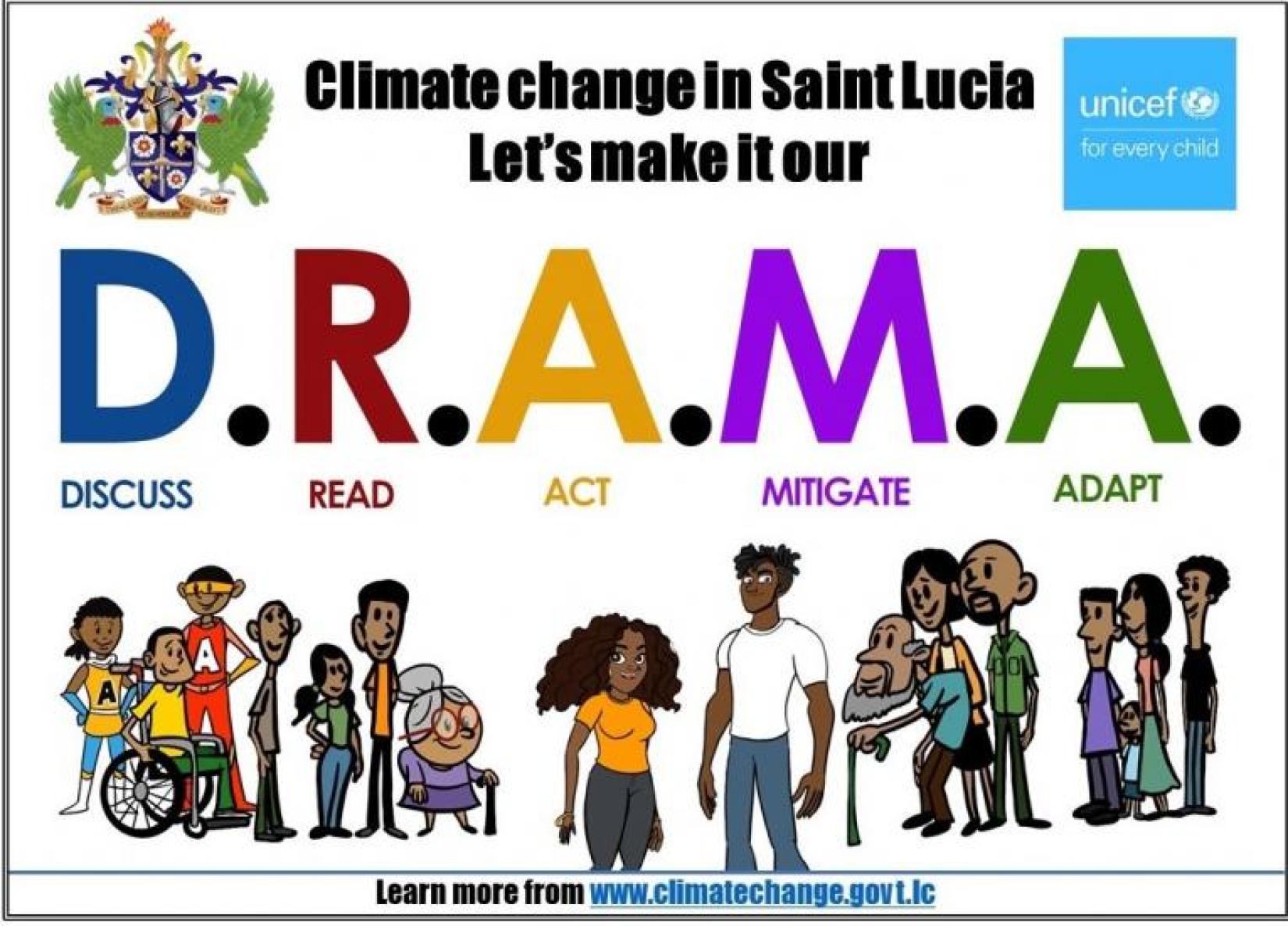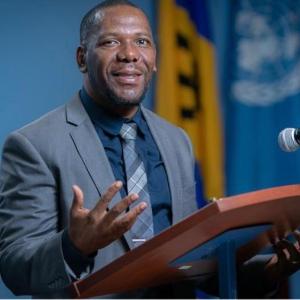Climate change video released for Earth Day 2021
21 April 2021
-
Saint Lucia Department of Sustainable Development and UNICEF

On the occasion of Earth Day 2021, and just over six months prior to the 26th Conference of the Parties to the United Nations Framework Convention on Climate Change (UNFCCC, COP26), the Department of Sustainable Development (DSD) of the Ministry of Education, Innovation, Gender Relations and Sustainable Development is launching Climate Change In Saint Lucia: Let’s Make It Our D.R.A.M.A., a stimulating 4-minute animated video designed to raise public awareness about climate change, particularly among youth, and accelerate climate action across the country.
The video, created by local artist Ted Sandiford of Acid Kreationz, in collaboration with DSD and UNICEF, features musician Ezra D' Funmachine Augustin and radio host Francheska "Franny" Solomon as narrators. It is built around the acronym D.R.A.M.A., which is used as a mechanism that helps viewers memorize 5 key actions (Discuss, Read, Act, Mitigate and Adapt) to tackle climate change.
“The Department of Sustainable Development, as the Climate Change Focal Point, wished to translate the commitment of the Government of Saint Lucia to fight climate change, in concrete and easy-to-remember terms”, said Permanent Secretary, Ms. Anita Montoute.
“Tools such as the Let’s Make It Our D.R.A.M.A. video, are key to inform and educate the public, holding each one of us accountable to contributing to building our nation’s resilience”, she added.
The animated video is intended to be used in schools, summer camps, among youth groups and otherwise, to introduce students to, and help galvanize action on, climate change, while sharing information on the Government’s plans such as the Nationally Determined Contribution (NDC) and the National Adaptation Plan (NAP).
“Saint Lucia is the first country to produce such a youth-friendly video to present its new NDC. The NDC itself is sending a strong message to the world by encouraging young people’s involvement in decision-making processes related to climate change, the defining challenge of our age”, said Dr. Aloys Kamuragiye, UNICEF Representative for the Eastern Caribbean Area.
“UNICEF is committed to supporting vulnerable populations across the Caribbean in dealing with intensifying and multiplying shocks, from the climate crisis, the COVID-19 pandemic, to the present volcanic eruption in Saint Vincent”, he added.
Background information
Saint Lucia submitted its revised Nationally Determined Contribution (NDC) in January 2021, in the lead up to the 26th Conference of the Parties to the United Nations Framework Convention on Climate Change (UNFCCC, COP26), scheduled from 1-12 November 2021 in Glasgow, United Kingdom.
The revision of the NDC (that follows the first NDC of 2015) was led by the Department of Sustainable Development of the Ministry of Education, Innovation, Gender Relations and Sustainable Development. It sets priority targets, including a 7% reduction in carbon emissions in the energy sector by 2030, relative to 2010, through the improvement of legislation for power generation, regulation and ramping up of electric vehicle penetration.
The NDC is aligned with national and sectoral adaptation planning processes (efforts to reduce vulnerabilities and build resilience, otherwise known as adaptation) and Sustainable Development Goals (which include SDG13 on climate action). It also refers to the COVID-19 pandemic, which is both a threat due to its immediate public health and socio-economic impacts, and an opportunity to promote a green recovery.
Saint Lucia is calling on all countries to increase their climate ambition by ensuring that their NDCs are in keeping with their contributions to global emissions and by taking action that will result in the limitation of global temperature increase to 1.5°C above pre-industrial levels as per the 2015 Paris Agreement. At the Climate Ambition Summit organized in December 2020, the Honourable Prime Minister, Allen Chastanet pleaded for climate finance to be available to vulnerable countries such as Caribbean Small Island Developing States (SIDS), so that they can, among others, deliver their NDC targets by 2030.


